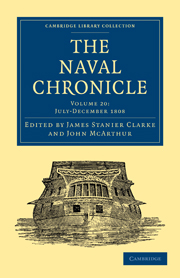 The Naval Chronicle
The Naval Chronicle Book contents
- Frontmatter
- PLATES IN VOLUME XX. From Original Designs
- PREFACE TO THE TWENTIETH VOLUME
- MEMOIR OF THE PUBLIC SERVICES OF THE LATE CAPTAIN WILLIAM HENRY JERVIS, OF THE ROYAL NAVY
- MEMOIR OF THE PUBLIC SERVICES OF SIR CHARLES BRISBANE, KNT. CAPTAIN IN THE ROYAL NAVY
- MEMOIR OF THE PUBLIC SERVICES OF THE LATE JOHN BENBOW, ESQ. VICE-ADMIRAL OF THE BLUE SQUADRON
- BIOGRAPHICAL MEMOIR OF GEORGE NICHOLAS HARDINGE, ESQ. LATE CAPTAIN OF THE SAN FIORENZO
- MEMOIR OF THE PUBLIC SERVICES OF THE LATE SIR HYDE PARKER, BART. VICE-ADMIRAL OF THE BLUE SQUADRON
- MEMOIR OF THE PUBLIC SERVICES OF THE LATE SIR CHARLES SAXTON, BART. COMMISSIONER OF THE NAVY AT PORTSMOUTH
- INDEX
- Plate section
MEMOIR OF THE PUBLIC SERVICES OF THE LATE SIR CHARLES SAXTON, BART. COMMISSIONER OF THE NAVY AT PORTSMOUTH
Published online by Cambridge University Press: 10 January 2011
- Frontmatter
- PLATES IN VOLUME XX. From Original Designs
- PREFACE TO THE TWENTIETH VOLUME
- MEMOIR OF THE PUBLIC SERVICES OF THE LATE CAPTAIN WILLIAM HENRY JERVIS, OF THE ROYAL NAVY
- MEMOIR OF THE PUBLIC SERVICES OF SIR CHARLES BRISBANE, KNT. CAPTAIN IN THE ROYAL NAVY
- MEMOIR OF THE PUBLIC SERVICES OF THE LATE JOHN BENBOW, ESQ. VICE-ADMIRAL OF THE BLUE SQUADRON
- BIOGRAPHICAL MEMOIR OF GEORGE NICHOLAS HARDINGE, ESQ. LATE CAPTAIN OF THE SAN FIORENZO
- MEMOIR OF THE PUBLIC SERVICES OF THE LATE SIR HYDE PARKER, BART. VICE-ADMIRAL OF THE BLUE SQUADRON
- MEMOIR OF THE PUBLIC SERVICES OF THE LATE SIR CHARLES SAXTON, BART. COMMISSIONER OF THE NAVY AT PORTSMOUTH
- INDEX
- Plate section
Summary
“Nurtur'd in youth upon the wat'ry plain,
He brav'd the thousand perils of the main,
And gain'd at length a title justly due.”
——Anon.Sir charles saxton was the descendant of a Berkshire family. Edward Saxton, his father, was a London merchant; and his mother was the daughter of Thomas Bush, Esq. of Burcott, in Oxfordshire. He was the youngest of seven children, and was born in the year 1732.
He is believed to have been originally intended for the navy; he entered the service in 1745. Previously to the year 1760, he received an appointment, as lieutenant, from Admiral Watson, on the East India station; and after his return to England, he held the same rank on board the Modeste in the early part of the year just mentioned, and was first lieutenant in the action with Conflans, 1759. On the 11th of October, 1760, he was promoted to the rank of commander; and in 1761, according to Charnock, “he commanded the Fubbs yacht, ordered to the continent, for the conveyance to England of her present majesty and her suite.” In the list of the squadron which was employed upon that occasion, we, however, find only one yacht (the Royal Charlotte) mentioned, and she was commanded by Captain, afterwards Admiral Sir Peter, Denis. His other services, as commander, are wholly unrecorded.
On the 28th of January, 1762, Captain Saxton was made post, and appointed to the Magnanime, under Commodore Lord Viscount Howe.
- Type
- Chapter
- Information
- The Naval ChronicleContaining a General and Biographical History of the Royal Navy of the United Kingdom with a Variety of Original Papers on Nautical Subjects, pp. 425 - 495Publisher: Cambridge University PressPrint publication year: 2010First published in: 1808


